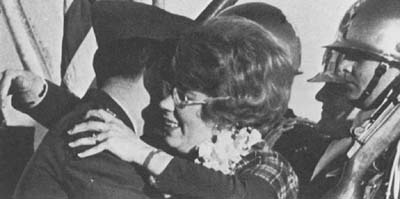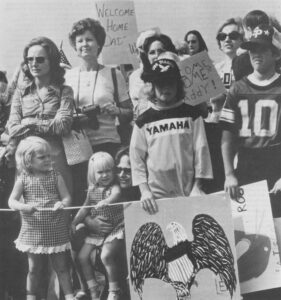(FT. MYER, VIRGINIA)-Saturday evening the Officers’ Club is packed with couples dressed up for a night out. At first glance, the dimly lit red-carpeted lounge could be part of any Holiday Inn in the country. But there are a few reminders that this is not a civilian establishment: in the lobby an officer with an iron-grey crew cut complains to an employee about the slackness of the Club’s organization, comparing it unfavorably with his own command. Wine ordered in the bar is served in the same miniature bottles dispensed by airlines. And every few minutes the MUZAK is interrupted by a loudspeaker announcement that Col. So-and-so’s table is ready.

The four middle-aged women seated around a corner table are the only women in the Club without escorts, and for them, this once-familiar scene has become awkward. “I feel perfectly comfortable being here,” one of them declares. “I don’t feel out of place.” Her companions nod their agreement, yet no one fails to notice the edge in her voice. For the truth is that they no longer feel at home in a military enclave. Each of the women is in the process of divorce from a husband in the military and by extension from the military world itself. Together they have put in 102 years as military wives, shopping at post commissaries, swimming and golfing at Officers’ Clubs, training children to stand at attention while taps is played every evening, watching (or giving) demonstrations of Japanese flower arranging at Wives’ Club luncheons, seeing military doctors, sending hundreds of Christmas cards to friends now stationed elsewhere, throwing promotion parties as husbands ascend the ranks and, above all, packing, moving, and unpacking. These and other rituals provide a feeling of belonging that is as comforting to those inside the military world as it seems claustrophobic from an outsider’s perspective.
The women at the Club no longer live “inside the bubble,” as one of them describes the military way of life. But because their divorces are not yet final they still retain citizenship papers-the military dependent ID cards, which entitle them to the “privileges” of the military lifestyle, including use of the Officers’ Club. Out of a combination of habit and bravado, they have chosen the Club as their meeting place on this Saturday night to discuss their grievances and what might be done about them.
Several of the women arrive with file folders bulging with newspaper clippings on court rulings, articles analyzing the plight of the middle-aged divorcees, and court documents from their own divorce hearings. After decades of mastering the countless regulations that govern military family life, they are as adept as jailhouse lawyers at keeping track of the complex maze of legal findings and proposed legislation that pertains to their situation.
None of these women had wanted a divorce. They attribute the failure of their marriages to “a combination of the Pentagon syndrome and the mid-life syndrome.” What this means, they explain, is that military officers are apt to be ordered to Washington- where there is a large population of unattached women and less public scrutiny than on a military post-just at a time in their lives when the men are most susceptible to forming out side attachments. The divorces that result are part of a national trend; in the past ten years the U.S. divorce rate has doubled and a quarter of all divorces now occur in marriages that have lasted 15 years or more.
Women who married “for keeps” in the 1950’s are now, in the 1970’s, finding themselves divorced and with no independent economic base. These military wives are not the only women who turned their personal ambitions to supporting their husbands’ careers only to find themselves abandoned just when the years of sacrifice are beginning to pay off. But the military offers the most extreme example of what Hanna Papanek, a sociologist, has described as the ” two-person career.” The term refers to “a special combination of roles whereby wives are inducted by the institutions employing their husbands into a pattern of vicarious achievement.” 1 Within the military, the expectation of support from “the distaff side” is explicit: “The wife of an officer exerts a powerful influence upon the success of his career,” claims The Officer’s Guide. As social head of the family, she must “be a good soldier” ready to stand “almost shoulder to shoulder” with her husband. 2 Those military wives who prefer to lead their own lives find a number of practical obstacles. The frequent disruptions of the household, irregular hours and long periods of separation that are a peculiar feature of military life usually prevent the wife from developing a sustained career. Even those trained in 61 portable professions”-teaching or nursing-are never able to build up seniority. As the women who gather at the Officers’ Club have come to see, the harsh consequences of this way of life for women become apparent when divorce enters the picture.
Meg Carson worked as a teacher for 10 of the 20 years she was married to her pilot husband, but “I had to start at the bottom of the ladder everywhere we went.” Once her divorce is final, moreover, she will no longer be eligible for the military health care that now covers most of her medical needs. Because of her age and because she has been operated on for cancer, she won’t be able to find adequate private health insurance she can afford. And although her present teaching job provides medical coverage, her lack of seniority in the school system means she will be among the first to be laid off in a cutback.
Molly Denis, a slim, elegant woman of 54, speaks with the slow southern drawl that is often heard on Army posts. Before her divorce, Denis had the most the Army can offer in the way of reflected glory: she was a general’s wife. In 29 years of marriage, she moved 19 times. Fifteen years ago her husband was ordered to the Washington area; with her children grown and the prospect of a lengthy-by military standards- stay in one place, Molly Denis took a job teaching school in Fairfax County, Virginia. In spite of the late start, she rose to the top of the pay scale in the county school system, but resigned before she became eligible for pension benefits in order to retire with her husband. They had planned to build a house in rural Virginia where they could live a settled life. But then the General announced he was in love with another woman and wanted a divorce. The temporary alimony awarded to Denis was not enough to live on, so she returned to teaching in her old school system at a much lower pay level. According to an official of the Fairfax County School System, Denis’s loss of seniority stands to cost her a total of about $35,000 in retirement pay.
Although she had sacrificed the pay raises and promotions that would have guaranteed her a financially secure retirement in her own right, Denis’s disrupted teaching career was raised against her at her divorce hearings. Her husband claimed “that I was not a proper military wife, that I had done nothing to help him since he had become a general. True, I didn’t take part in the daytime Officers’ Wives Club activities during the years I was teaching, but I was bringing money for our family. And I entertained! I entertained just as much as anyone else! I entertained on weekends after I had taught all week.”
What compensation is there for a wife who contributes to her husband’s career? The Officer’s Guide suggests “a very special place in heaven” and indeed, there seems little else to look forward to if the marriage ends up in the divorce courts.
Several bills now pending in Congress address the problems women like Meg Carson and Molly Denis must contend with. One of these would extend military medical benefits to divorced spouses who were married at least 20 years to people who were on active duty for 20 years. Another bill, introduced by Rep. Patricia Schroeder (D., Colo.), would award a share of the retirement pay of a member of the armed services to a divorced spouse who had been married at least 10 years while the service member was on active duty. The exact amount would be determined by the number of years of marriage that overlapped with years of military service; the maximum the former spouse could collect would be 50 percent of retirement pay. Schroeder has proposed similar legislation for Foreign Service and Civil Service spouses. In introducing her bill to amend the military retirement plan; she explained that it was based upon the thesis that marriage was an economic partnership. “It is my contention,” she said, “that the former spouse made a significant contribution to the service member’s ability to earn the wage and consequently to receive the pension … while there is no dispute that homemakers perform valued services for their families and society, it is frequently argued that pensions are an earned retirement benefit. However, I think it is important that the concept of earned benefits be applied to these homemakers, who, after contributing substantially to an economic partnership, find themselves divorced in their middle years, unable to work and ineligible for social security.”
Schroeder contends that the existing remedies are inadequate for several reasons. The trend in divorce is toward no-fault settlements in which the wife is awarded support for a limited period if at all. Legal costs for contested divorces are prohibitive and the courts have been inconsistent in determining whether pensions should be considered part of community property.
Opponents of the Schroeder bill are legion within the military. They argue that such legislation would create more inequities than it would resolve. According to an editorial in Retired Army Bulletin, if the bill passed, it will “naturally make those retirees who must share their monthly paycheck feel like big losers…”
Captain Henry Palau of The Retired Officer’s Association calls the bill “outrageous interference in a personal decision.” “There are as many military men,” he says, “who have made a career in spite of their wives as there are wives who have been done dirt.” According to Palau, his organization has not yet done any lobbying against the Schroeder bill because of “a gut reaction that it’s just too far out and there’s no need to get involved.”
His assessment of Patricia Schroeder is contradicted by a Pentagon attorney with feminist sympathies who did not want to be identified. “Pat Schroeder is considered an anathema around here,” she says, “and that’s a very good sign because it means people think she’s a serious threat. Otherwise they’d just ignore her.”
Pat Schroeder’s name will become even more of an anathema around the Pentagon if the women gathered at the Ft. Myer Officers’ Club have anything to do with it. They have formed an organization, EXPOSE, 3 for the purpose of supporting the passage of legislation that could prevent military wives from facing a destitute old age. “After all,” says Laura Kaye, married 24 years to an Army Pilot, “we have put ourselves on the line for our country just as much as our husbands have. All we want is what we’re entitled to-what we’ve worked for so many years.”
Endnotes
- Hanna Papanek, “Men, Women and Work: Reflections on the Two Person Career,” American Journal of Sociology, Volume 78, no. 4.
- The Officer’s Guide, Harrisburg, PA 1973
- EXPOSE – Ex Partners of Servicemen for Equality – can be reached at 6101 Arlington Blvd., Falls Church, Virginia 22044
The names of the women have been changed.
©1979 Ann Banks
ANN BANKS is studying the Military Family on her APF fellowship.




